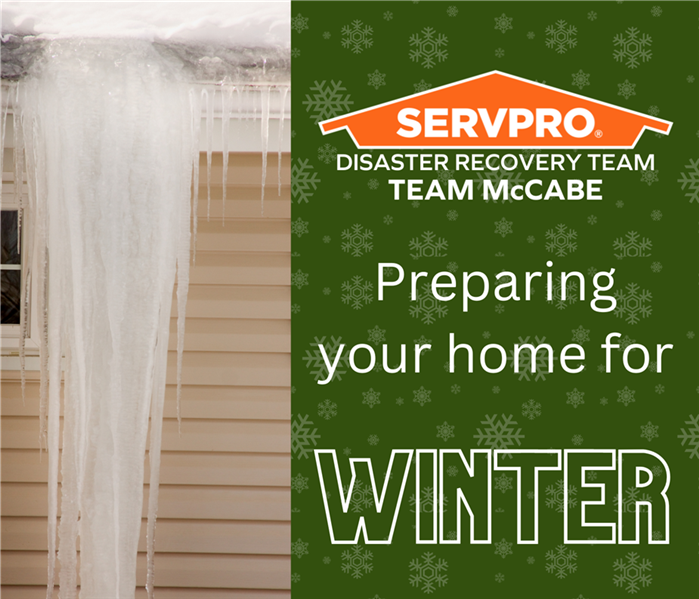Preparing Your Home for Winter
11/29/2022 (Permalink)
 In the event of any winter damage to your home this winter, do not hesitate to give us a call, we are here to help.
In the event of any winter damage to your home this winter, do not hesitate to give us a call, we are here to help.
Whether this is your first winter in your new home or your fifteenth, there are some measures you should take to prepare your house for the next few months. While your personal plan may be to turn on the heat and hibernate through the winter, the snow, ice, and rain can still cause your home some serious issues inside and out.
The outside of the house is the number one hassle we think of in the winter, there is shoveling, plowing, and clearing off the cars. Unfortunately, snow can accumulate and cause a lot of direct damage to the house. Snow buildup can cause strain on the roof and should be removed as soon as it is safe. Ice can also accumulate on your gutters causing ice dams that are not only dangerous to your home but can also cause injury if it falls or is removed unsafely. Your gutters should be cleaned by removing leaves and other debris before the first storm of the season and if you do see ice building up you can clear them using a de-icing agent or a heated gutter cable to remove them without causing injury. Frequent temperature changes can also put cracks in your chimney which should be monitored throughout the winter so that repairs can be made as soon as the weather improves. Another outdoor situation to monitor is the surrounding trees; as snow and ice gather no tree limbs they can become weighed down and snap causing damage to the home or other surrounding structures. Trees should be pruned in the fall and cleared as needed during the winter to prevent any potential damage.
The cold can cause cracks in the caulk within the house causing drafts and affecting your heating bill. The wet conditions can also cause rotting along your door frames. This can lead to termites in the spring and even extensive damage that might result in you needing a new door frame. Be sure to check for any wood rot along the bottom of the door frame and fill in any damage with epoxy wood filler as needed. Frozen pipes are arguably the most prevalent issue with a few things that can be done to help prevent them. If you are looking for more specific prevention ideas for frozen pipes see our most recent blog here: https://loom.ly/uT2gKoA
The basement can also be a problem area and not just with your sump pump, though that is definitely a common element in basement focused water losses. When the heavy snow begins to melt it can seep into the basement or even cause the foundation to crack. With any signs of water in the basement be sure to check if your sump pump is working properly, and that the extension hose is draining. If the temps are below freezing remove the extension hose before a freeze causes a backup into your home. Ensure you have the proper yard drainage and repair any foundation cracks as needed throughout the winter.
These are just a few areas to keep an eye on as the temperatures drop and we close out the year. Hopefully, these tips will help prevent some water losses however they may not be completely foolproof. If you do notice any damage to your property this winter do not hesitate to give us a call, we are here to help.

 24/7 Emergency Service
24/7 Emergency Service